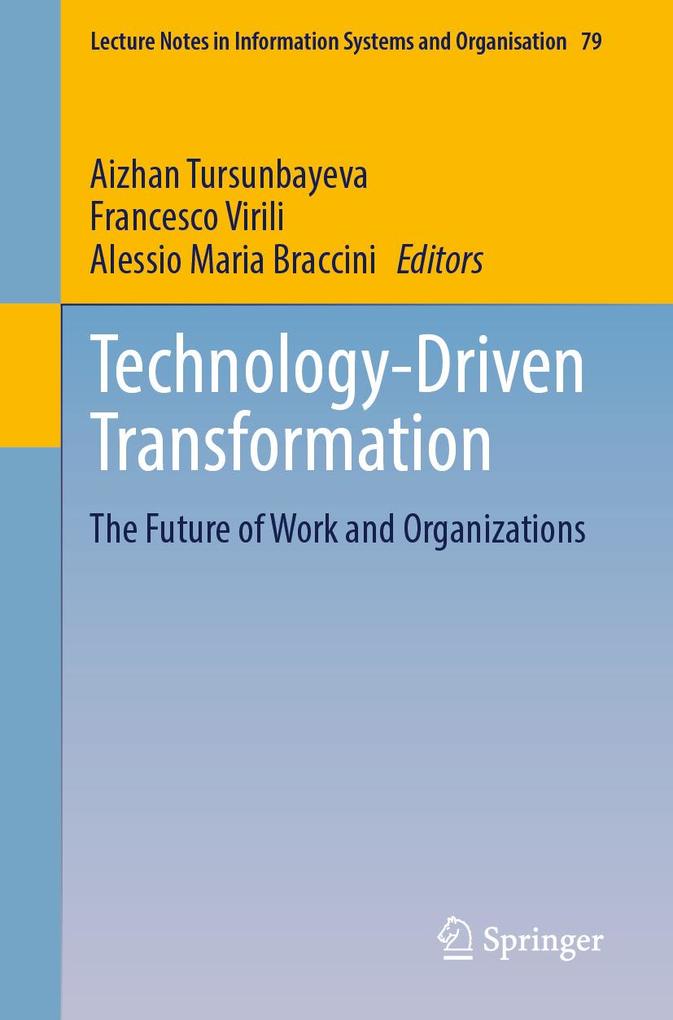
Technology is a transformative force that redefines how organizations operate and shapes the modern workplace. This book examines the wide-ranging impacts of digital transformation, emerging technologies, and data-driven decision-making on both individuals and organizations, offering insights into topics such as business analytics, digital maturity, and the adoption of innovations like AI and blockchain.
It explores how organizations can harness real-time data, measure key performance indicators, and adopt processes based on new technologies. The book also investigates critical issues such as knowledge retention, workplace diversity, algorithmic transparency, and the unintended consequences of technological advances on employee well-being and workplace dynamics in hybrid and AI-driven environments.
By integrating interdisciplinary frameworks, empirical research, and case studies, this book provides a comprehensive resource for academics, practitioners, and policymakers navigating the complexities of digital transformation. Based on revised versions of top double-blind peer-reviewed papers from the annual Italian Chapter of the Association for Information Systems conference, held in Piacenza, Italy, in October 2024, it offers valuable guidance for embracing technology-driven change.
Inhaltsverzeichnis
Chapter 1. Work and Organisations of Tomorrow: Technology-driven Change. - Chapter 2. Configuration of the Data Value Chain: Reflections on the Digital and Analogue Dimensions. - Chapter 3. Employee Perception of Human-robot Co-working: Evidence From the Hotel Sector in Russia, Egypt, and Italy. - Chapter 4. The Strategic Role of HR in Hybrid Work Environments: An Application of the `Harvard Model. - Chapter 5. Gig Work in Organizations: Demystifying the Perspectives of Human Resource Management Professionals. - Chapter 6. Technology Worsening Employees Life: A Qualitative Study to Understand Determinants, Effects and Solutions. - Chapter 7. Exploring the Interpersonal Relationships in Virtual Reality: A Systematic Literature Review. - Chapter 8. Algorithmic Transparency and Algorithmic Accountability in Organizations. - Chapter 9. Gender-aware Business Process Management. - Chapter 10. Towards Assessing Digital Maturity: Utilizing Real-time Public Data for Organizational Benchmarking. - Chapter 11. Driving Factors in the Technology Acceptance of Generative Artificial Intelligence Insights From an Exploratory Interview Study With Digital Leaders. - Chapter 12. Fostering Organizational Cybersecurity Culture Amid Rapid Digital Transformation: A Case Study From Ethiopia. - Chapter 13. The Metamorphosis Behind Digital Transformation: An Integrated Framework From Change Management. - Chapter 14. Exploring Chatbot Adoption in the Italian Legal Domain: A Fuzzy-set Qualitative Comparative Analysis. - Chapter 15. A Systematic Literature Review on Emerging Technology Adoption Across Time. - Chapter 16. Determinants of Blockchain Adoption in Accounting: A Case Study Analysis. - Chapter 17. State of the Art of Business Analytics for Enterprise Transformation Steering. - Chapter 18. The Four E Model Evaluating Gen AI in a More Balanced Way. - Chapter 19. Advances in Measuring Soft Skills in Project Management. A Technology-mediated Approach to Capture the Enacted Behavior. - Chapter 20. Empowering Smes: The Role of Generative AI in Knowledge Retention. - Chapter 21. Digital Skills and Maturity in the Public Sector: A Review of EU Guidelines. - Chapter 22. What if the Essential Were Invisible to Decision-making? Designing an Interactive Eye-tracking Study on the Voluntary Contribution Mechanism.
Produktdetails
Entdecken Sie mehr
Bewertungen
Es wurden noch keine Bewertungen abgegeben. Schreiben Sie die erste Bewertung zu "Technology-Driven Transformation" und helfen Sie damit anderen bei der Kaufentscheidung.









